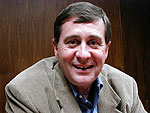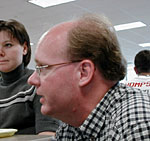By Mark Steil
Minnesota Public Radio
October 11, 2002
The race for Minnesota's 1st District U.S. House seat is a three-way affair. Incumbent Republican Gil Gutknecht faces candidates from both the DFL and the Green parties. Iraq, agriculture, and medical care are major issues in a district which has changed since the last election. Ten counties have been added. Gutknecht's challengers think redistricting gives them a better chance of beating the four-term representative. But Gutknecht says the new 1st District voters are his kind of people.
| |
|
|
|
||
The 1st District once occupied a cozy corner of southeast Minnesota. It was centered on Rochester, but included cities like Mankato, Austin, Winona and Albert Lea. But when a five-judge panel redrew the congressional map last spring, the district nearly doubled in size. It's nicknamed the "I-90 district" now after the interstate highway it follows from the Wisconsin to South Dakota borders. That means more voters and a host of introductions.
Democrat Steve Andreasen says the expansion of the 1st District helps him. He says it reduces the natural advantages of incumbency.
Redistricting added 10 counties to the 1st District and all the candidates are new to the voters in those counties.
During a campaign stop at Minnesota State University in Mankato Andreasen said the 1st District is a good place for a political newcomer to start.
"I think the 1st District is the most fiercely independent congressional district in the state of Minnesota," he said.
He believes the district is almost equally split between Democrats, Republicans and Independents. He says the voters think for themselves and aren't afraid to vote for a first time candidate. But Andreasen isn't a political novice. He spent more than a decade in Washington D.C. working for the State Department and the National Security Council before returning to Minnesota last year.
He was criticized during the DFL endorsement race for his Washington ties. But Andreasen says voters never bring it up.
| |
|
|
|
||
"What I sense is folks actually appreciate that I have not only my Minnesota roots, but also experience in Washington working on national security issues for a number of years. And that's an attractive combination to people I think as they look ahead to the challenges that are going to face the Congress and our nation over the next decade," Andreasen said.
He says his experience is well-suited to what has become a major issue in the district: Iraq. Andreasen favors the use of force as a last option. He wants weapons inspectors to go back to Iraq. But he says they must have "anytime, anywhere" access and force is an option if that standard is not met.
The focus on Iraq in the 1st District has overshadowed traditional election-year issues like farming, health and education. The major candidates all agree that Saddam Hussein is a threat, but differ on how to deal with him.
Green Party candidate Greg Mikkelson says the U.S. should be cautious. "I think we should be working with the rest of the world, and I would not be in favor of a U.S. lead attack on Iraq. Attacking seems to be the easy way. It's always tougher to negotiate and try and work out your problems," Mikkelson says.
Mikkelson farms near Lake Crystal. He also runs a grain business. Mikkelson admits he isn't completely in step with the Green Party platform, but says he's working in that direction. For example, the party platform promotes organic farming over chemically-dependent agriculture. Mikkelson still uses herbicides, but says he's cutting back.
Farming is important but it's not the major issue in his campaign. Mikkelson is most interested in changing the political system. He says money has taken over politics. He says candidates are too obligated to their contributors. He has a different vision of political life.
| |
|
|
|
||
"It's about putting the issues in front of the people; understanding what I'm about and me understanding what they're about. Not about fundraising and smiling and waving and kissing babies," he says.
But there was a time this fall when Mikkelson almost dropped out of the race. He employs about a dozen people in his grain business. In late September one worker became trapped in a storage bin and died. Mikkelson's first impulse was to quit the grain business and politics. But friends and supporters urged him to continue.
"It makes most of our human endeavors seem pretty trivial when we're faced with a tragedy like this. Is it worth it really to be working so many hours and to be campaigning and fighting for issues here?"
He says the one issue he cares about most is getting more people involved in the political system. Mikkelson says most politicians stay in office too long. He might be surprised that the incumbent he's trying to beat agrees with that.
"I honestly do believe in term limits," says 1st District Rep. Gil Gutknecht. "The problem is we've never been able to get them passed."
The Republican from Rochester has won all of his elections by comfortable margins. He was first elected to Congress in 1994. His closest call came two years later, a six-point win.
Before Congress he served six terms in the Minnesota House. He says while he believes in term limits he also likes the benefits of seniority. "I am now the third ranking member on the Budget Committee. I am the vice chairman of the full Science Committee. I can get more done and I know my way around better today because I have seniority."
Gutknecht has been busy working the new first district counties since the lines were redrawn last spring. He says voters there seem to like his message. "I made it my first pilgrimage to places like Fairmont, and Jackson and Worthington, Pipestone. And the reception has been just excellent."
One issue the voters are asking about is Iraq. Gutknecht supports the House Iraq resolution which calls for diplomacy but also sanctions force if needed. Gutknecht predicts if it comes to war, the U.S. will have allies.
"Will Germany ever join this effort? Probably not. But I think Czechoslovakia will, I know that Great Britain will, I know that Spain will, I know that Italy will, and I believe that ultimately Russia will join us in that effort, because I think they all understand that this isn't just America's war," he says. "This really is about defining whether we have the will to stand up to despots who will build and ultimately deploy weapons of mass destruction."
Gutknecht says the Iraq debate and budget issues will keep the House in session well into October. That means he can only campaign during weekends. But Gutknecht isn't worried. He says a strong base of volunteers and money will make up the lack of campaign time.
More from MPR


